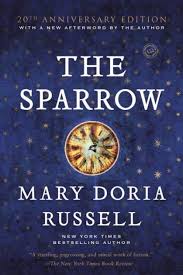Mary Doria Russell had a problem.
She was teaching anthropology and came to stories of the massive mistakes explorers from the West sometimes made when they first encountered different people groups around the world. Often death, pillaging, and slavery resulted.
Inevitably, students would say something to the effect of, “Oh, I would never make a mistake like that. How could they have done something so stupid?”
But Russell knew that even though it seemed simple, it wasn’t. How could she adequately explain that first contact is just much more difficult than we can imagine? That’s what motivated her to write her profound, wonderful, absorbing novel The Sparrow.
She imagines a group of intelligent, well-meaning, goodhearted, skilled people who make an effort to meet a species from another world. One reason I especially like the novel is that this is just a great group of people. If I were to go on a multiyear journey, these are absolutely the kind of people I would love to travel with.
Despite this team having far more gifts, abilities, and experiences than her students or most of us, things go wrong—terribly wrong. Even the most benign actions like trying to improve nutrition for those they meet had disastrous effects they had difficulty anticipating.
Should we never try to help people in other cultures? Should we never try to fix things that seem wrong? That’s not my point.
Rather, when we do, we should approach such efforts with a maximum dose of humility. We need to give the benefit of the doubt to people who act in ways we find wrong or unenlightened. We need to learn as much as we can before we act.
Why? Because we just don’t know what we don’t know. We don’t adequately appreciate the finite, limitations of human knowledge or of our own perspective. Nor do we appreciate enough how our fallen, sinful nature can unconsciously skew our opinions about what is wrong with the world and how to fix it.
What can we do when we encounter people we think are strange or just wrong?
- Remember how fun it is to learn new, surprising things.
- Don’t automatically dismiss information or ideas that are contrary to our viewpoints.
- Remind ourselves that we are finite and that our motives or emotions may be skewing our outlook in ways we aren’t aware of.
- Ask those we are trying to help what they think would be the best ways we could be of assistance.
- Remember that all of us—the people we are trying to help as well as those we disagree with—are people with God-given value and dignity.
Try to help others? By all means, and always with great humility.


Hi, Andy. I started reading your blog last month and have enjoyed and benefitted from your observations about writing and books. I began reading “The Sparrow” based on your recommendation. I have plowed through the first 225 pages, hoping to find something as profound as you apparently did, and have given up in disappointment.
I do not consider this a great work by any means. It seems to go very slowly, and I do not find the science fiction or the theology compelling. As a Christian, I am also turned off by Anne Edwards’ repulsive, filthy language. I do not think this is necessary to provide drama or realism.
Please let me know if you think I am missing something about this novel that you seem to love a great deal. Meanwhile, I will continue to read your blog and to benefit by most of your other observations.
Hi Darrell. Thanks for your thoughtful comments. Yes, I do appreciate The Sparrow. I know about 25 people who have read the book on my recommendation. Of those, you are now the second who didn’t like it. No problem. Not all books are for everyone. I would say you shouldn’t feel obligated to finish it or figure out what might be worthwhile about it.
Sometimes when a book bothers me or I have questions about it, I will read various reviews from established sites or on Goodreads, from those who liked it and those who didn’t. That can help me figure out what I think. But you may not even have the motivation to do that in this case…and that is also ok!
Thanks again.
Peace,
Andy